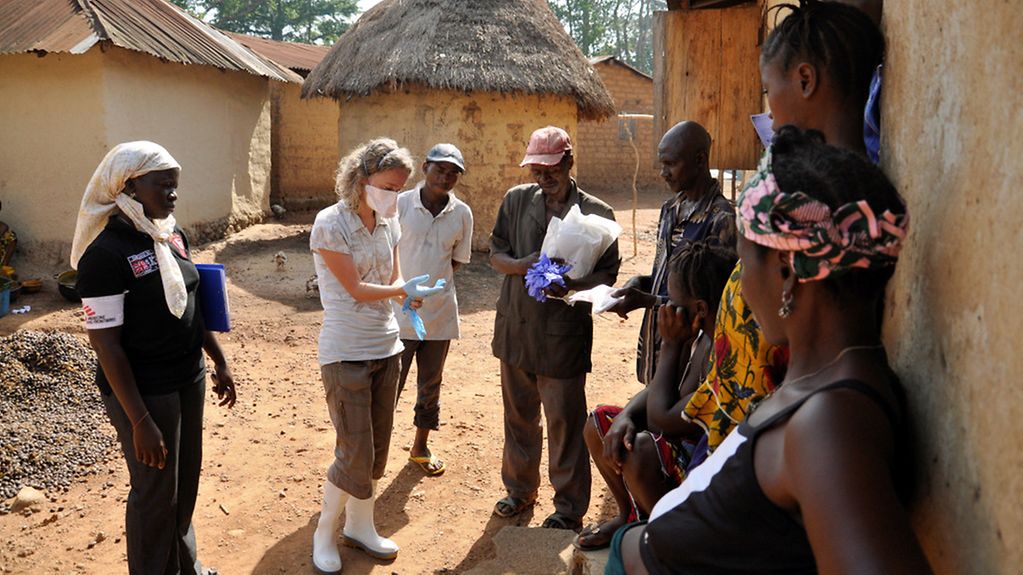Ebola epidemic in West Africa
Germany has been providing active assistance for months in the fight against the Ebola outbreak. So far the German government has made available around 17 million euros to finance aid measures. The options for providing additional personnel and materials are currently being explored, said federal government spokesman Steffen Seibert.
3 min reading time

Liberia, Sierra Leone and Guinea have been worst hit by the epidemic
Photo: picture alliance/dpa/Amandine Colin/Ärzte ohne Grenzen
The scale of the Ebola epidemic in some West African states is giving cause for serious concern. The German government has been supporting the World Health Organization (WHO) and NGOs operating in these areas, including Médecins Sans Frontières, since the outbreak began.
Since April experts from the Robert Koch Institute and the Bernard Nocht Institute for Tropical Medicine have been working in the areas affected by the crisis. To date these institutes have seconded 15 specialists to help stem the spread of the epidemic.
Engagement to fight Ebola
The German government has so far provided some 17 million euros to finance aid measures, including about 6.8 million euros in Federal Foreign Office funding to support projects of Médecins Sans Frontières, Welthungerhilfe, Humedica, the Bernhard Nocht Institute and the WHO. "We must expect a continuing rise in the number of people infected," said Frank-Walter Steinmeier on Thursday. There is no end to the emergency in sight. The countries of the region, in particular Liberia, Sierra Leone and Guinea do not have the resources to cope with the epidemic, he said.
The German Federal Ministry for Economic Cooperation and Development has provided emergency aid worth ten million euros via the WHO, which has set up stations to treat Ebola patients in crisis-affected regions, as well as financing and supplying protective materials and drugs, and training health service staff including nurses and doctors to deal with Ebola patients.
This outbreak of Ebola in West Africa is the worst epidemic since the virus was first identified in 1976. The WHO has so far reported some 4,000 confirmed cases and over 2,100 deaths.
Mobile hospital for Liberia
On Friday government spokesperson Steffen Seibert reported that the Bundeswehr would be providing two aircraft to ensure air transport support, and that a field hospital to treat Ebola patients would be sent to Liberia. There can be no doubt that further assistance will be needed, which is why the German government will review and adjust the support it provides at regular intervals.
Currently the major challenge is to put in place the conditions needed before doctors and medical staff can be seconded to the affected countries. This includes the capacity to evacuate infected helpers, for which specially equipped aircraft are needed.
Germany does not currently have these capacities. The German government is working as swiftly as it can, with international partners, to put in place the capacities required, stressed Steffen Seibert.
Consultations about additional assistance
During a meeting with the Emir of Qatar at the Federal Chancellery, the Chancellor promised additional German assistance. Air transport services are planned to evacuate people working for civilian organisations in the region. A field hospital has also been in discussion. The WHO too is receiving support.
Over and above this, the German government is currently exploring options for providing additional personnel and material support. To ensure further progress, the responsible State Secretaries are meeting this afternoon to discuss the crisis at the Federal Foreign Office.
The German government will also be putting the Ebola epidemic on the agenda for the G7 Foreign Ministerial in New York on 25 September under the German G7 presidency.
No risk of Ebola spreading in Germany
Ebola is an extremely rare life-threatening infectious disease. In all probability fruit bats are the source of the virus, although this has not yet been definitively ascertained. Humans and animals can become infected if they come into contact with infected fruit bats. The disease is communicated through contact with body fluids of victims (e.g. vomit, blood or sweat). Although the World Health Organization has declared an "international public health emergency", the population of Germany is not at risk. Countries like Germany comply with all WHO recommendations. Should an Ebola patient arrive in Germany all preconditions are already on place to ensure safe treatment.